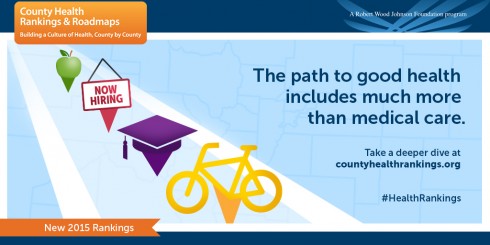The 2015 County Health Rankings reveal that Washington, D.C. has experienced the greatest decrease in premature births since the launch of the County Health Rankings in 2010
The Robert Wood Johnson Foundation and the University of Wisconsin’s Population Health Institute have released the sixth annual County Health Rankings. The County Health Rankings show us where we live matters to our health and provide counties with an annual check‐up of their health. The Rankings provide local-level data that allows each state to see how people from one county to another compare on a range of factors that determine health— unemployment, education, community safety, diet and exercise, and other areas to ensure that every community is a healthy place to live, learn, work, and play. Learn more at www.countyhealthrankings.org
The Institute for Public Health Innovation serves as the state-team lead for the District of Columbia for the annual County Health Rankings release. Although Washington, D.C. is not usually compared to other counties due to its unique jurisdictional status, this year’s Rankings reveal that Washington, D.C. has had the greatest decrease in premature births since the initial County Health Rankings release six years ago.
The Rankings also revealed the following national trends:
- Premature death rates are dropping, with 60 percent of the nation’s counties seeing declines. But for many counties these rates are not improving – 40 percent of counties are not making progress in reducing premature death.
- One out of four children in the U.S. lives in poverty. Child poverty rates are more than twice as high in the unhealthiest counties in each state than in the healthiest counties.
- Violent crime rates are highest in the South. Violent crime rates, which affect health, well-being, and stress levels, are highest in the Southwest, Southeast, and Mississippi Delta Regions.
- Having a job influences health. Unemployment rates are 1.5 times higher in the least healthy counties in each state as they are in the healthiest counties. During the recession, counties in the West, Southeast, and rust belt region of the U.S. were hit hardest by growing unemployment. Many, but not at all, of these counties have seen their unemployment rates drop since the recession ended in 2010.
Stay tuned for an upcoming event hosted by the Institute for Public Health Innovation and Washington Parks & People in early May 2015 to explore how a variety of factors influence opportunities for health in Washington, D.C.


